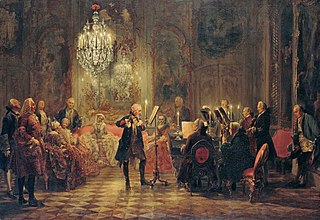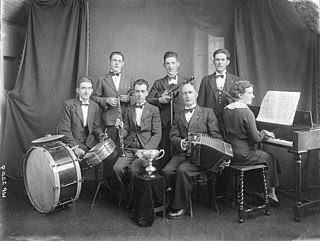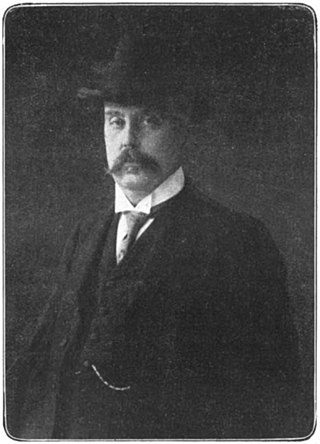Related Research Articles

Chamber music is a form of classical music that is composed for a small group of instruments—traditionally a group that could fit in a palace chamber or a large room. Most broadly, it includes any art music that is performed by a small number of performers, with one performer to a part. However, by convention, it usually does not include solo instrument performances.
A piano trio is a group of piano and two other instruments, usually a violin and a cello, or a piece of music written for such a group. It is one of the most common forms found in classical chamber music. The term can also refer to a group of musicians who regularly play this repertoire together; for a number of well-known piano trios, see below.

A septet is a formation containing exactly seven members. It is commonly associated with musical groups but can be applied to any situation where seven similar or related objects are considered a single unit, such as a seven-line stanza of poetry.
Willibald Karl Boskovsky was an Austrian violinist and conductor, best known as the long-standing conductor of the Vienna New Year's Concert from 1955 to 1979.

The Octet in F major, D. 803 was composed by Franz Schubert in March 1824. It was commissioned by the renowned clarinetist Ferdinand Troyer and came from the same period as two of Schubert's other major chamber works, the 'Rosamunde' and 'Death and the Maiden' string quartets.

In music, an octet is a musical ensemble consisting of eight instruments or voices, or a musical composition written for such an ensemble.
In music, a nonet is a chamber music composition which requires nine musicians for a performance. The standard nonet scoring is for wind quintet, violin, viola, cello, and double bass, though other combinations are also found. Additionally, the term may apply to a group of nine musicians regardless of whether they are playing chamber music.
The Septet in E-flat major for clarinet, horn, bassoon, violin, viola, cello, and double bass, Op. 20, by Ludwig van Beethoven, was sketched out in 1799, completed, and first performed in 1800 and published in 1802. The score contains the notation: "Der Kaiserin Maria Theresia gewidmet". It was one of Beethoven’s most popular works during his lifetime; much to the composer's dismay. Several years later, Beethoven even wished the score to have been destroyed, saying: "That damn work! I wish it were burned!"
The Léner String Quartet, sometimes written the Lehner String Quartet, was a string quartet of Hungarian origin, founded in Budapest in 1918, which for most of its pre-war career operated in or from London. They appeared at the Royal Albert Hall, London on three occasions between 1922 and 1926. They also performed in New York, Amsterdam, and elsewhere in Europe. The Léner made the first complete recorded cycle of Beethoven quartets.
William Waterhouse was an English bassoonist and musicologist. He played with notable orchestras, was a member of the Melos Ensemble, professor at the Royal Northern College of Music, author of the Yehudi Menuhin Music Guide "Bassoon", of The New Langwill Index, and contributor to the New Grove Dictionary of Music and Musicians.
Felix Mendelssohn's Sextet in D major, Op. 110, MWV Q 16, for piano, violin, two violas, cello, and double bass was composed in April–May 1824, when Mendelssohn was only 15, the same time he was working on a comic opera Die Hochzeit des Camacho. Its composition took place between the Viola Sonata and the Piano Quartet No. 3. It also preceded the famous Octet, Op. 20 by about a year. 1824 is also the probable year of the composition of the Clarinet Sonata. Like the latter, the Sextet was not published during the composer's lifetime. Its first edition was issued in 1868 as a part of a complete collection of Mendelssohn's works. Hence the misleading high opus number.
The Melos Ensemble is a group of musicians who started in 1950 in London to play chamber music in mixed instrumentation of string instruments, wind instruments and others. Benjamin Britten composed the chamber music for his War Requiem for the Melos Ensemble and conducted the group in the first performance in Coventry.
Cecil Aronowitz was a British viola player, a founding member of the Melos Ensemble, a leading chamber musician, and an influential teacher at the Royal College of Music and the Royal Northern College of Music.
Ivor McMahon (1924–1972) was an English violinist. He played with notable orchestras including the Philharmonia Orchestra and the English Chamber Orchestra and is best known for playing second violin in the Melos Ensemble.
Graeme Peter Crump, known professionally as Peter Graeme and as 'Timmy' Crump to friends and family, was an English oboist and academic teacher. He was best known as the principal oboist of the Melos Ensemble.
The International Classical Music Awards (ICMA) are music awards first awarded 6 April 2011. ICMA replace the Cannes Classical Awards formerly awarded at MIDEM. The jury consists of music critics of magazines Andante, Crescendo, Fono Forum, Gramofon, Kultura, Musica, Musik & Theater, Opera, Pizzicato, Rondo Classic, Scherzo, with radio stations MDR Kultur (Germany), Orpheus Radio 99.2FM (Russia), Radio 100,7 (Luxembourg), the International Music and Media Centre (IMZ) (Austria), website Resmusica.com (France) and radio Classic (Finland).
Victor Bruns was a German composer and bassoonist. He played with the Leningrad Opera, the Volksoper Berlin and the Staatskapelle Berlin. As a composer, he is known for his ballets and for bassoon concertos and sonatas.

Abraham "Bram" Eldering was a Dutch violinist and music pedagogue.
Wilhelm Stross was a German violinist and composer. He was professor at the Hochschule für Musik und Theater München and the Hochschule für Musik und Tanz Köln as well as first violin of the Stross Quartet.
The Philharmonia Quartet Berlin is a string quartet founded in 1985 by members of the Berlin Philharmonic.
References
- 1 2 3 Tommasini, Anthony (17 November 2007). "British Composer Sits In With Visiting Berliners". The New York Times . New York. Retrieved 31 August 2017.
- ↑ Downey, Charles T. (16 March 2014). "Scharoun Ensemble Berlin plays Schubert with polish at Library of Congress". The Washington Post . Washington. Retrieved 31 August 2017.
- ↑ Karweik, Hans (30 May 2014). "Scharoun-Ensemble tritt nochmals auf". Braunschweiger Zeitung (in German). Braunschweig. Retrieved 31 August 2017.
- ↑ Hanssen, Frederik (16 August 2010). "Ins Matterhorn blasen". Die Zeit (in German). Hamburg. Retrieved 31 August 2017.